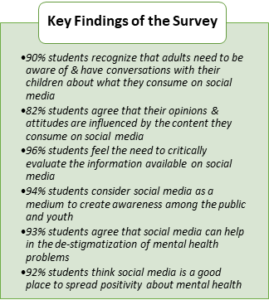Team L&M
Now, this is something which does not come as a surprise. After all, we have been observing this trend for the last few years. A study, conducted by the Behavioural and Mental Health department of Fortis Healthcare, found that social media plays a pivotal role in forming opinions and attitudes among a majority of school students today. It confirmed that as many as 78% students spend a lot of time on social media. A majority of 92% agreed it is a conducive platform to spread positive narration about mental health.

The study noted that the content which the students see via various social media platforms do contribute towards influencing their opinions and attitudes. The students admitted that the content which they see via various social media platforms do contribute towards influencing their opinions and attitudes. The role and influence of social media in shaping the belief systems and attitudes of the young generations is very evident, affirmed Dr Samir Parikh, Director, Mental Health & Behavioural Sciences, Fortis Healthcare under whose supervision the survey was done.
“The ability of social media to influence the belief systems and attitudes of the youth cannot be contested. But it is heartening that majority of the students recognise social media as an effective means to create awareness about relevant issues. We need to capitalise on the role that social media platforms play in the creating alternative and positive narratives around social issues. Finding ways of building the engagement of young people with platforms that are driven to create awareness, encourage help-seeking and act as a support system is a must in this regard. There is a need for us to evaluate the way we are approaching mental health in the context of the young population and find better mechanisms of connecting and engaging with them on mental health. There is untapped potential that needs to be fully utilised to build mental health related awareness,” shared Dr Parikh.
The survey was conducted among 4,000 school students studying psychology in class XI and XII, from over 200 schools across 10 cities — Delhi-NCR, Mumbai, Mohali, Ludhiana, Jaipur, Bengaluru, Lucknow, Varanasi, Dehradun and Chennai. The idea behind this survey was to understand the relevance of social media in present times, the impact it has and how it has the power to shape narratives which influence their opinions and attitudes. The survey highlighted the need for media literacy among parents. Knowledge of social media would enable parents to understand their child’s perspective better and provide insights into how time spent on social media could be more productive and constructive.